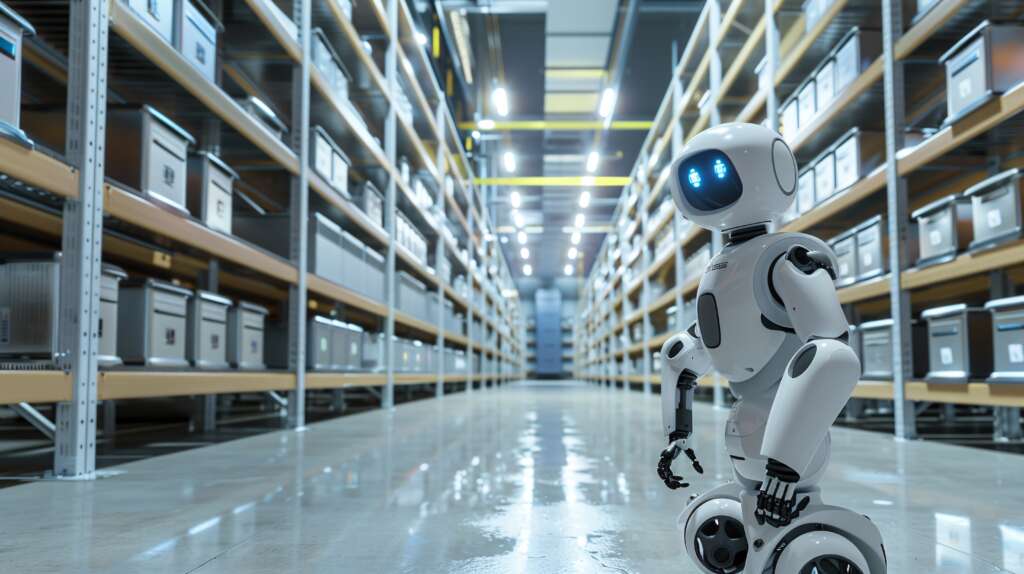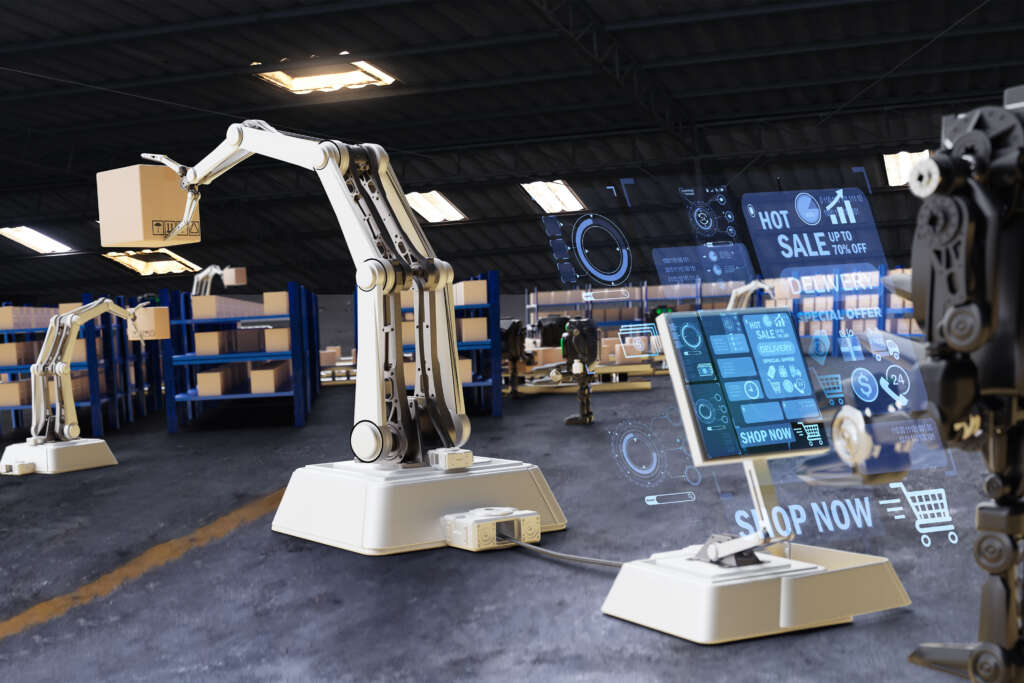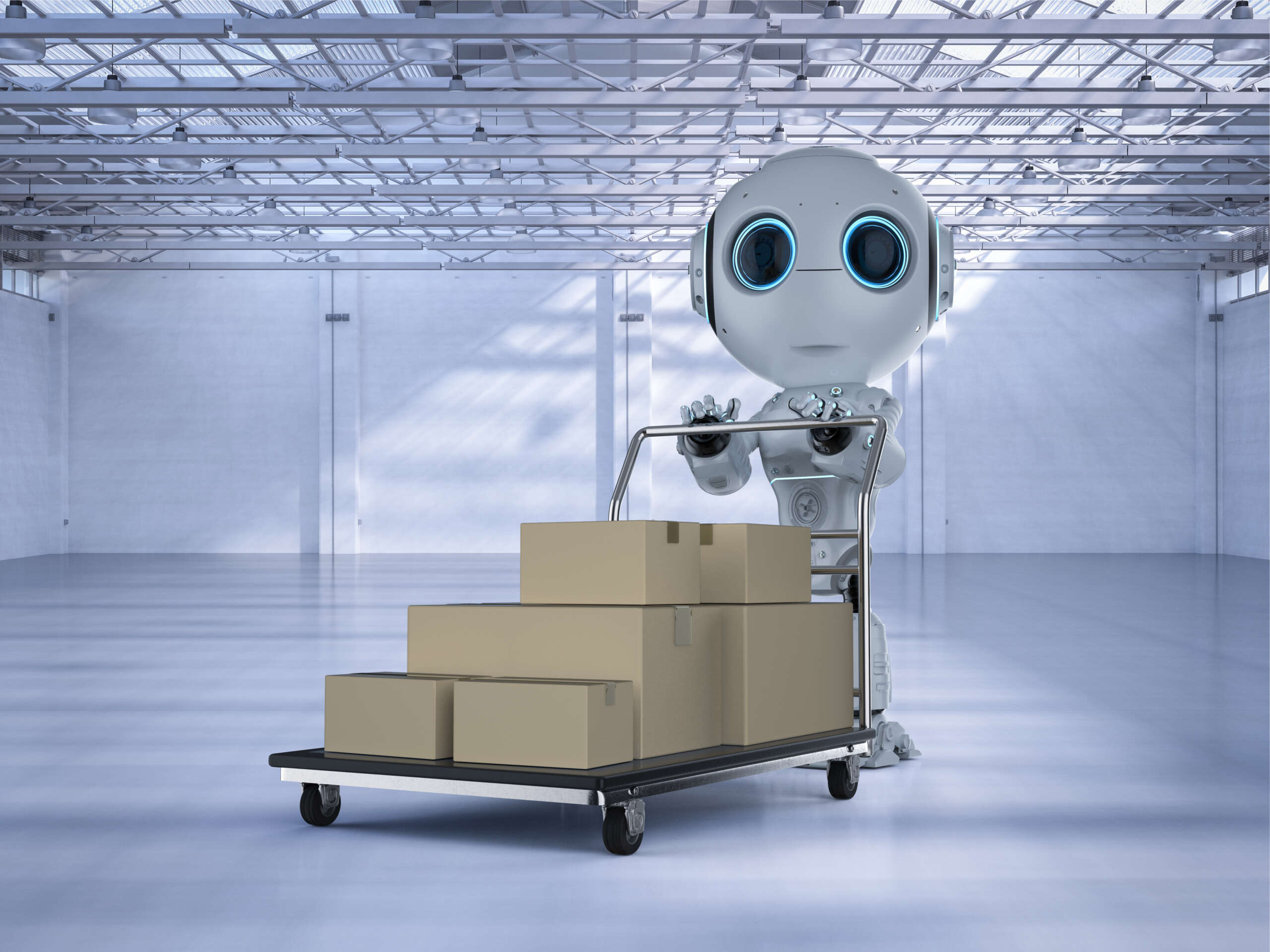The transformative impact of AI-powered logistics is changing the supply chain industry in big ways. Predictive analytics, automation, and better decision-making are leading us into a new era. This era focuses on enhancing efficiency and streamlining operations.
Gartner forecasts that by 2027, 75% of companies will use cyber-physical systems in their warehouses. This change is huge, with AI expected to improve supply chains and logistics by 30 to 50%. But how will humans and machines work together? The mix of technology and human skills is changing the workforce. It’s creating a team where each side uses its strengths best.
AI isn’t just about better inventory management or improving delivery times. It’s also key in the new world of drone delivery networks, set to handle about 70% of city deliveries. This changes how we think about getting packages. Plus, AI is making global trade faster, working ten times faster than old methods. The supply chain industry is changing fast, leading to a smarter, more connected future.
AI-Driven Innovations Redefining Supply Chain Management
In today’s world, making things more efficient and precise is key in supply chain management. AI-driven logistics are changing the game. They’re expected to grow to $64,459.38 million by 2030, showing how vital AI is for modern supply chains. ThroughPut AI is a great example, making operations run smoother and cutting waste in real-time.
Supply chain tracking has hit new heights thanks to AI. It helps businesses predict delays and adjust on the fly. This quick response is key in a world where fast results are expected. Plus, advanced analytics use data to make smart decisions, making supply chains stronger and more reliable.
DHL has used AI-powered forklifts to boost productivity and safety. United States Cold Storage has improved its scheduling with AI, making its service better. These tech advances aren’t just about making things automated. They’re about making things more precise and cutting down on mistakes, which speeds up supply chain work.
AI helps with everything from warehouse layouts to managing stock in real-time. Its role is key in many parts of the supply chain. This shows how important AI is becoming, as it learns and gets better at doing tasks. As companies use AI more, they’re training workers in AI and data analysis. This prepares them for leading in new, tech-driven environments.
By adopting these AI-driven innovations, supply chains get better and move towards a future where smart tech makes sure goods and services flow well worldwide.
Reshaping Transportation Management with Artificial Intelligence
AI is changing how we manage transportation, making it smarter and more efficient. It helps fleet managers make better decisions by analyzing lots of data. This leads to better fleet management and lower costs for companies.
AI has made a big impact on logistics, like finding the best routes. These routes use less fuel and cut down on maintenance costs. They also get deliveries done faster, saving companies 15% on operations.
Predictive analytics are key to AI’s success. They help businesses predict and prepare for supply chain issues. This makes operations up to 20% more efficient.

AI also improves safety and follows strict rules in areas like cold chain logistics. It keeps products safe during transport, even when things change. Using AI in freight management has led to better traffic management systems.
These systems cut down on traffic by 25% and make roads safer, reducing accidents by 30%. This shows how AI is making logistics safer and more efficient.
AI is also helping the environment by managing resources better. It uses less fuel and cuts down on emissions. This shows how AI is key to making logistics better for the planet and businesses.
As we go forward, AI will keep playing a big role in changing logistics. It’s making transport systems smarter and more efficient. We’re moving towards a future where transport is not just automated but also very smart and efficient.
AI-Powered Logistics: Integration of Advanced Technologies
The use of AI in global supply chains has changed how we manage these complex networks. It shows how important IT is in making logistics better. With 79% of companies using generative AI and 22% using it often, next-gen supply chain with AI is changing the industry.
AI tech like machine learning, self-driving cars, and predictive analytics is making things run smoother. Companies like Amazon and UPS use AI to make managing inventory and planning delivery routes better. This has made things faster and cheaper. For example, UPS uses the ORION algorithm to cut down on fuel use and delivery time. This shows how powerful IT and AI supply chains can be.

AI has huge potential to change supply chain logistics. It can predict demand, making supply chains more visible and shortening lead times. This can increase efficiency by over 20%, as shown in a study in the International Journal of Production Economics. Yet, only 38% of supply chain leaders feel their teams are ready for these technologies. This shows there’s a big need for more training and investment in AI.
DHL is working towards net-neutral emissions by 2050 with electric vehicles and alternative fuels. This shows how tech and green efforts can work together. It helps achieve business goals and supports global environmental efforts. So, AI in global supply chains is key for business and the planet.
As AI becomes more common in supply chain processes, global trade management is set to change a lot. This will lead to new levels of efficiency and new ways of doing things.
The Intersection of AI and Global Supply Chains
The impact of AI in global supply chains is huge. It makes supply chains more efficient and supports sustainability in supply chain efforts. AI helps by analyzing big data, predicting problems, and finding the best routes quickly.

Predictive analytics in freight management is changing the game. It can handle huge amounts of data from transportation. For example, AI looks at miles driven, fuel used, and how loads are spread out. This helps predict delays and suggest better routes.
AI-driven technologies are forging paths to smarter, more resilient supply networks that are crucial for global trade efficiency and sustainability.
Transportation companies are moving to cloud-native apps from old systems. This change helps automate and improve how they handle driver pay. It also makes customer service better with quick answers and updates.
AI can also make sustainability in supply chain better by improving how loads are matched for spot procurement. AI can do this job 20% better than old methods. This means moving goods more efficiently and cutting down on environmental harm by using less.
In conclusion,AI in global supply chains is real and making trade better. As companies use more AI, they’re setting new high standards in the supply chain world.
AI and the Human Workforce: A Collaborative Future
Artificial Intelligence is more than a new tech; it’s the base for a future where humans and AI work together. It’s changing jobs, making things more efficient, and creating a new kind of AI-driven workforce. Studies show that when humans and AI work together, they do better. This means businesses need to change how they work to use AI well.
The way we see jobs is changing, thanks to AI. The AI talent pool is getting bigger, but now, AI is more about making human workers better. In logistics, AI helps plan delivery routes better, making things run smoother. Over 60% of business leaders believe AI will make things more productive. AI helps make tasks more accurate and reduces mistakes, making it easier for people to learn and grow in their jobs.
Big companies like IBM are showing how AI and humans can work together to make things better. They’re using AI in healthcare, finance, and retail to make things run smoother. The future is about how well humans and AI work together. With AI expected to grow a lot by 2030, businesses need to make sure human-AI collaboration is strong. This way, people and technology can work together to reach the top of success.



